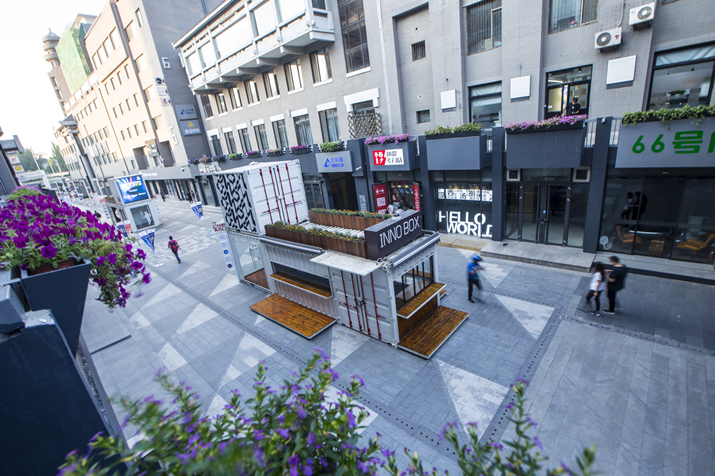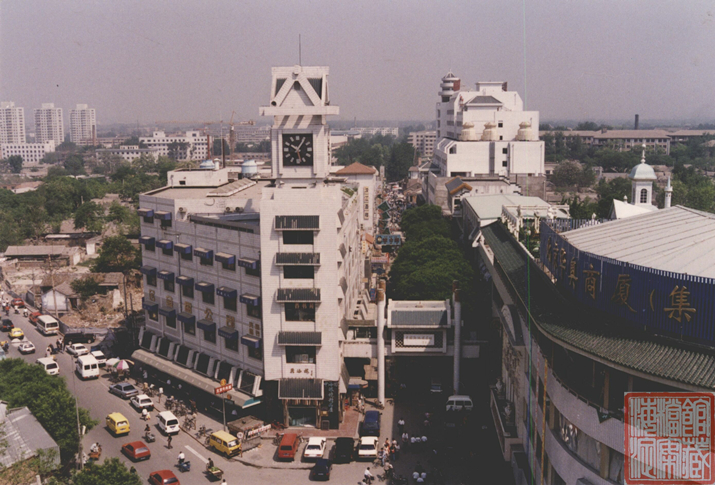|
||||||||||
| Home Nation World Business Opinion Lifestyle ChinAfrica Multimedia Columnists Documents Special Reports |
|
||||||||||
| Home Nation World Business Opinion Lifestyle ChinAfrica Multimedia Columnists Documents Special Reports |
| ChinAfrica |
| Transitioning Toward Innovation |
| Beijing's Zhongguancun area encourages startups to push the boundaries of innovation |
| By Ge Lijun ·2018-03-09 |

Zhongguancun Inno Way
Located in northwest Beijing, Zhongguancun is often referred to as China's very own Silicon Valley. However, the current reputation of this neighborhood as a hub of advanced Chinese technology contrasts sharply with its traditional clichéd image. Only a few years ago, this place was one of the largest wholesale markets for electronic products. The way Zhongguancun was able to transition toward innovation by attracting startups continues to surprise visitors, whether Chinese or foreigners.
Indeed, Zhongguancun used to be a crowded place, with thousands of distributors and small electronics merchants. Buyers had to elbow their way to find the item they needed, and then negotiate the price over the hustle and bustle of the market. Around the year 2000, the neighborhood saw some 30,000 to 40,000 visitors each day. Despite its overwhelming popularity, Zhongguancun did not enjoy a good reputation. Counterfeit products sold on the market undermined consumer confidence. The rise of e-commerce giants, such as JD.com and Alibaba Group's Taobao, became the death knell of these old-style wholesale markets. Zhongguancun quickly fell into inertia.
To remedy the situation, in July 2009, local government in Beijing's Haidian District took the decision to overhaul west Zhong
guancun. Turning its back on electronic products wholesale, the area should instead transition toward innovation-based activities, said the district authorities. The new policy was quick to show results. In 2016, almost all electronics markets in the neighborhood had closed down.
At the same time, a wave of significant changes swept across west Zhongguancun. The area contains two large buildings which housed nearly 200 bookstores at the time. However, these also suffered from the rise in the online sale of books. It is here that in 2013, Beijing decided to establish a business incubator area to attract and foster high-end startups focusing on innovation.
A year later, on June 12, 2014, the two buildings were renamed as Zhongguancun Inno Way (ZIW). This 45,000-sqare-meter area was transformed in order to accommodate about 40 business incubators.
"Zhongguancun area is home to a number of prestigious universities and research institutes, so funds for scientific research are abundant there. Zhongguancun is, therefore, a source of both technology and talent," Nie Lixia, Executive Director of Zhongguancun Inno Way Ltd., the company in charge of ZIW, told ChinAfrica. To survive and grow, innovative technologies have to be accepted and recognized by the market, she added. However, not every innovative technology or product can succeed. "You need a set of environmental and innovation factors, which are very important," she added.
A new kind of "innovation ecology"
With this in mind, ZIW set for itself the mission to foster "innovation ecology," said Nie. Several factors must be brought together for a technology to become a product. For example, to create a startup, a team needs to find an office, to seek funding, and even to receive entrepreneurship training.
"Zhongguancun brings all these factors together. In addition, the government provides subsidies when capital or services are needed for innovation. The innovation cost for startups is, therefore, relatively low," she said.
Kutu Tech Service is one of the startups that moved in Kr Space, one of ZIW's incubators, in September 2017. For this young company, "moving in" meant renting a 12-square-meter office with five tables. The startup pays 11,000 yuan ($1,753) each month, that's $4.8 per day for every square meter. This is more expensive than in a normal office building where the price for a square meter is only $1.3 per day.
"Nevertheless, I prefer to rent here. Kr Space offers an area of almost 300 square meters for different companies to share. The relatively high price also includes costs for water, electricity, heating, Internet and printing services, and even coffee and tea. Of course, as we grow, we will have to find a place of our own," Pan Gaofeng, Chief Executive Officer of Kutu Tech Service, told ChinAfrica.
In addition to a workspace, Kr Space also offers support on taxes and finance, in addition to organizing training sessions and conferences.

Zhongguancun Inno Way before 2013
For Pan and several other entrepreneurs, the attention given by the Chinese Government to startups played a key role in their decision to start a business. On May 7, 2015, Premier Li Keqiang visited several startups in ZIW. In the 2016 Report on the Work of Government, Li once again stressed the importance of encouraging innovation and entrepreneurships.
Ever since it opened, ZIW has provided services to more than 10,000 aspiring entrepreneurs. So far, more than 1,900 startups have been incubated, of which 222 were headed by foreigners or returned overseas Chinese. This means an average of 1.7 projects incubated every day. A total of 743 startups received funding amounting to 9.1 billion yuan ($1.5 billion).
Transition to the future
In October 2015, local government announced that Zhongguancun would complete its transformation by 2020, after which all traditional wholesale activities will be replaced by innovation-based firms. By then, the Chinese version of Silicon Valley will need to achieve a considerable improvement on its innovation and business environment.
In this process, ZIW will play a trend-setting role. Whether in China or from abroad, the incubator is constantly looking for the latest state-of-art technologies to help foster innovation. So far, ZIW has cooperated with 50 incubators in 30 countries. "On the one hand, ZIW is building a platform to bring the best foreign technologies to China; on the other hand, we also help Chinese technologies go abroad," said Nie.
On December 8, 2017, a strategic cooperation agreement was concluded between ZIW and the France-based Paris Region Enterprises (PRE), with a view to deepening their relationships in fields of innovation and entrepreneurships. In this context, ZIW will provide information and services to French companies who intend to expand their activities to China. PRE will return the favor by helping Chinese companies or entrepreneurs interested in the European market.
"Innovation knows no boundaries, which is a big challenge for us. The teams we serve are constantly innovating and developing, so we must continue to innovate and develop ourselves. In the future, our ability to offer services and build teams will be very important to follow this sector's development," concluded Nie.
| About Us | Contact Us | Advertise with Us | Subscribe |
| Copyright Beijing Review All rights reserved 京ICP备08005356号-5 京公网安备110102005860号 |